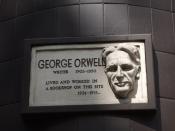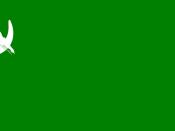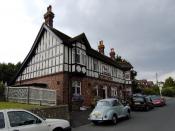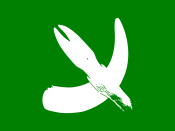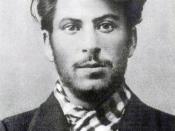George Orwell once said the Animal Farm, an anti-Soviet satire, was "the firstâ¦in which I tried, with full consciousness of what I was doing, to fuse political purpose, and artistic purpose into one whole." Animal Farm has masked as a manual's guide for many governments around the world. Orwell wrote Animal Farm as an attempt to make people notice the cruelty of Stalin's way of governing, Russia's new government and his opinions of revolutions.
The goal of Animal Farm was to get people to open their eyes to Stalin's way of governing Russia. But some people's eyes remained closed even after the book was published. George Soule did not open his mind to Animal Farm. He once said, "â¦the failure of this bookâ¦arises from the fact that the satire deals not with something the author has experienced, but rather with stereotyped ideas about a country." Orwell's use of "satire in the form of a 'fairy story'â¦to get his point across shows his indignation for hard-core ideological doctrines whose purposes are to lead to the eventful destruction of a society" (Unger).
The characters in Animal Farm are compared to the individuals and groups engaged in the Russian Revolution.
"But the seeds for Animal Farm are present in earlier works, not only in the metaphors likening men to beast but more important, in Orwell's whole attitude towards society, which he sees as an aggregation of certain classes or types" (Greenblatt 188).
The animal story begins with the Manor Farm's master, a human being, named Mr. Jones. He is compared to Czar Nicholas II because both men, fictional and non-fictional, are irresponsible and cruel to their animals or people. The character that stirs up the idea of rebellion is Old Major, Mr. Jones's prize-winning boar. Old Major is compared to Karl Marx because he invented communism and Old Major invented Animalism; both of them died before the revolutions they sparked began. Snowball's comparison to Trotsky is apparent because they were both advent leaders of Old Major and Karl Marx; they both wanted to improve life for all in Animal Farm or Russia, and they were both driven out by Napoleon's dogs or Lenin's KGB. Napoleon is obviously likened to Joseph Stalin. They both chose to not follow Old Major or Marx's ideas. They were cruel, brutal, selfish, devious, corrupt, power-hungry and killed all that opposed them. The dogs are compared to the KGB or Secret Police. Both were a private army that used fear to force support for Napoleon and Stalin and worked to kill or harm any of Napoleon or Stalin's opponents.
Animal Farm is the "clever satire on the betrayal of the Russian Revolution and the rise of Stalin" (Greenblatt 189). Orwell attacks Stalin and his "betrayal" of the Russian Revolution in Animal Farm (Connolly) through his animal characters.
"To Orwell, the proletariate is too easily swayed by its leaders as well as its guiding ideologiesâ¦they are the leaders which Orwell detests just as much as a society that allows them to emerge"(Unger).
In Animal Farm, Napoleon (Stalin) orders Squealer to convince the animals to believe and follow Napoleon and to change the Seven Commandments. Squealer is an exceptional speaker and is told by Napoleon to manipulate the "lower" animals into believing that the Seven Commandments were never changed and that Snowball was a traitor.
Many of the events that occurred in Animal Farm can be related to events which occurred in Russia. One event in particular was after the rebellion in Animal Farm-- the animals were so proud of their newly formed state that they took a green tablecloth and painted a white hoof and horn on it similar to the hammer and sickle of the former Soviet Union flag (Unger).
In Animal Farm, George Orwell expresses his opinion on revolution through Animalism. Some critics have compared Animalism to Marxism. In the beginning of Animal Farm, Old Major calls for a meeting in the barn and tells all the animals about a dream he had the night before. In his speech he explains that the animals should not have to live as they do and Old Major proposes that all the animals unite and rebel against their cruel owner or "master", Mr. Jones. Old Major called that once the farm was theirs and every animal was equal, Animalism would come into effect. Karl Marx called for a revolution in The Communist Manifesto by the proletariate to change the social structure of the state and its distribution of wealth (Unger). Old Major's ideas were pretty similar to Marx's; they both believed that everyone or every animal is equal.
The revolution in Animal Farm did not keep nationalism from disappearing, a point Orwell makes clear early on in the novel. "Orwell agrees with most revolutionaries in his estimate of the men who are actually ruling us, but differs sharply in his assessment of what will happen when they are swept away" (Dyson 187). Orwell thinks that the original intention of a revolution may have been ideal for a good life but always results in tyranny (Greenblatt 189).
"The book's major concern is not with these incidents but with the essential horror of the human condition" (Greenblatt 189). Orwell's attempt to express his opinion creatively on the Russian Revolution, Joseph Stalin, and revolutions with a satirical approach was successful because Orwell has made governments and people everywhere aware of what revolutions and absolute power can create and result in.
